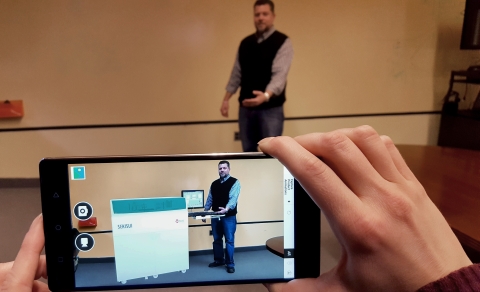Kaon Interactive Incorporates Augmented Reality Into 3D Marketing Platform

Kaon Interactive, a business-to-business software company and provider of 3D interactive product marketing applications, has launched new augmented reality (AR) experiences within its High Velocity Marketing Platform, a feature that was recently used by an exhibitor at CES in Las Vegas.
As the first immersive sales and marketing platform available for B2B marketers, Kaon AR integrates interactive, fully scaled 3D product models into real-world business environments, allowing users to interact with virtual representations of physical products and solutions in a more visually engaging way.
Think Pokémon Go, but for B2B product sales and marketing efforts.
Using AR-enabled mobile devices such as Lenovo Phab 2 Pro, users can explore product functions and features, view integrated marketing messages, see the item from any angle, and demonstrate product workflow and process, helping prospective customers develop a deeper understanding of the product, its dimensions and how it fits in their actual workspace.
In addition, the platform allows users to capture photos and videos of 3D models and share them via email with other purchasing influencers.
Along with 3D AR experiences and virtual reality, Kaon’s High Velocity Marketing Platform also provides user analytics, 3D product catalogs, lab configurators, data-driven calculators, CRM integration, social sharing, interactive white boarding and customer text editing tools.
With B2B companies constantly looking for ways to increase sales productivity and marketing effectiveness, it was a natural evolution for Kaon Interactive to integrate AR experiences into its 3D marketing platform to help clients tell their complex stories in a more simplified way, according to Gavin Finn, Kaon president and CEO.
“The effectiveness of marketing and sales experiences are dramatically increased when customers can see your products appear in their actual physical space and can then contextualize the benefits of that solution because they have that clear mental image of how that product fits and works,” Finn said.
He added, “It truly creates an emotional connection with prospects that transcends traditional sales and marketing relationships.”
Within the trade show space, Kaon AR can be used as an engaging and immersive customer experience to help exhibitors educate prospects about their products and solutions while also making a lasting impression.
“At CES the wow factor of demonstrating our cloud systems using augmented reality was amazing,” said Rachel Zerilla, marketing analyst at Seagate Technology and a Kaon Interactive client.
She continued, “Investors, customers, partners and analysts could walk right into the system to explore unique features and visualize it in the physical space at scale. It fit in perfectly as to how we were deploying technology innovation at the event.”
While 3D AR experiences haven’t permeated the trade show world quite yet, Finn believes this kind of immersive technology could soon become more and more prevalent at events.
“Currently (exhibiting) companies are not using AR to communicate their unique business differentiation; they are using it as a video game facade to drive people into their booths,” Finn said.
He continued, “Creating authentic 3D AR experiences for a B2B event is a very specialized high-end user experience that takes time for content creators to develop (but) over the next few months we foresee instances of 3D AR experiences becoming more readably available on larger tablets, making the experience friendlier for the B2B world.”


Add new comment